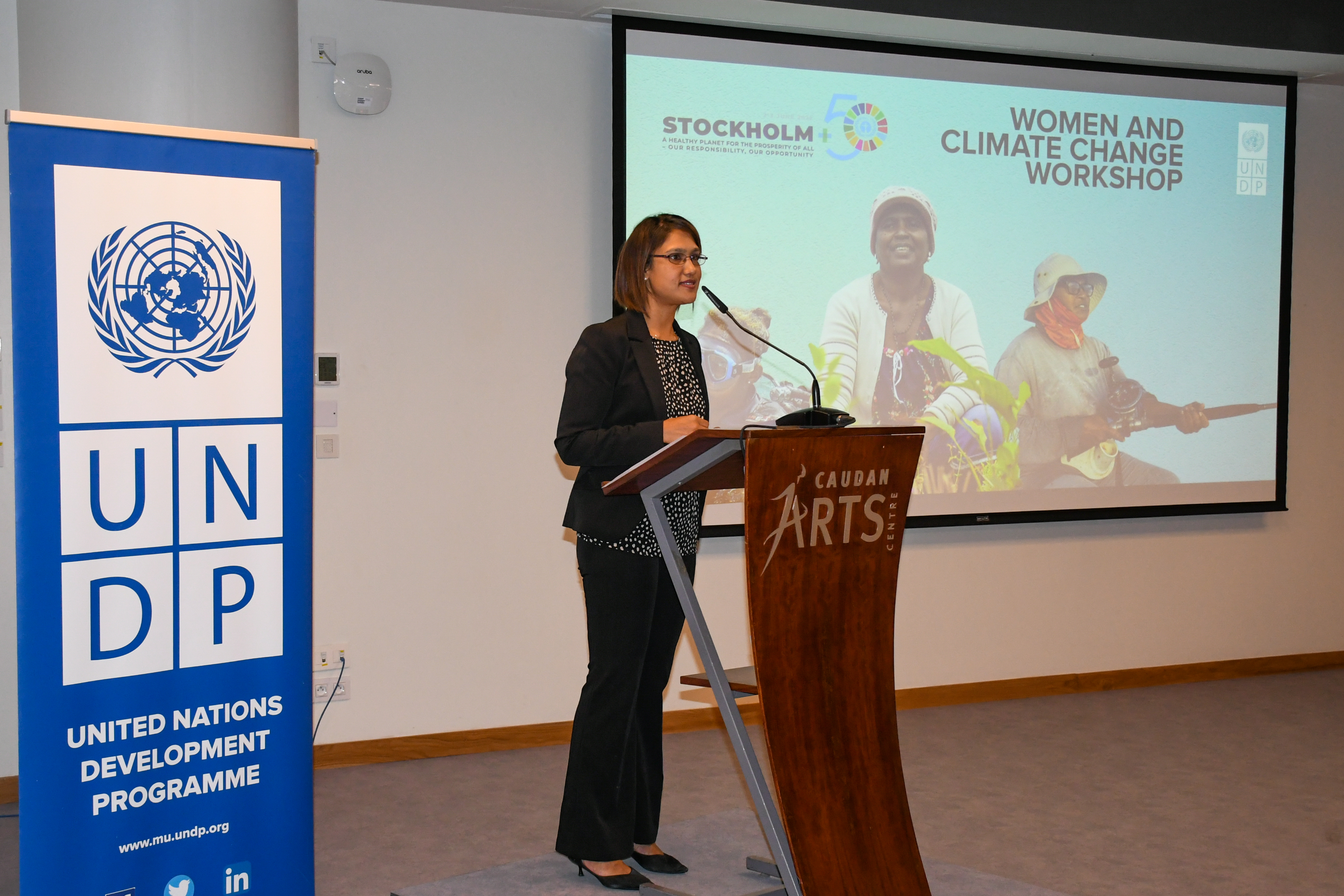The event aimed at highlighting opportunities for women in environment related activities and gaining a better understanding of their challenges and concerns concerning Climate Change.
The UNDP facilitates a dialogue on Women and Climate Change
September 12, 2022

This highly interactive session enabled the women present to express their views about potential contributions to achieve resilience and potential livelihood opportunities.
On 07 September 2022, the UNDP Mauritius Country Office organised a roundtable discussion on ‘Women and Climate Change’, as part of the Mauritius Stockholm + 50 initiative. The event aimed at highlighting opportunities for women in environment related activities and gaining a better understanding of their challenges and concerns concerning climate change. More than one hundred women joined the discussion, including fishers, entrepreneurs, Government Officers, and representatives from NGOs, Community Based Organisations and Women’s Associations.
The Stockholm+50 Conference, organized in June 2022 to commemorate 50 years of global environment action, was designed as a platform for countries to share ideas on ways to tackle the triple planetary crisis of Climate Change, pollution and biodiversity loss. In Mauritius, consultations involving different target audiences, revealed that women have an important role to play in climate action, the more so as the effects of Climate Change are being shaped by pervasive and deeply rooted gender inequality. The Women and Climate Change round table discussion held by the UNDP, under the Stockholm + 50 initiative, was thus another opportunity for women to share opinions on Climate Change and learn from solutions in areas such as Agriculture, Renewable Energy and Coastal Environment Protection.
Integrating Women as Key Stakeholders in Climate Action
While addressing the audience, the Honourable Kavydass Ramano, Minister of Environment, Solid Waste Management and Climate Change, emphasised that women are not just victims of adverse climate impacts, but they are also key agents of change: “Women have a vital role to play as environmental champions to advocate for climate action in their family and community.” He also added that since women are most impacted by climate change, they should be properly equipped to manage and cope with Climate Change.
Representing UNDP Mauritius and Seychelles, Dr. Tony Muhumuza, Senior Economist, emphasised the importance of having a participatory approach to development, and ensuring that the needs of women remain the cornerstone of UNDP’s work, in line with the newly launched Gender Equality Strategy: “At the level of policy making, emphasis is placed on a gender sensitive approach that not only recognises the diversity of women and girls, but also ensure their participation and leadership in formulating policies that are responsive to their specific needs.”
On behalf of the Minister of Gender Equality and Family Welfare, Mrs. Phoolranee Rampadaruth, Permanent Secretary, highlighted the importance of networking and the sharing of information and knowledge on sustainable production practices: “Women entrepreneurs are encouraged to network among themselves and identify opportunities for eco-entrepreneurship and green business ventures”.
Improving environmental education at all levels to contribute towards climate action
The event was also an opportunity to feature testimonies of women whose work is directly or indirectly correlated to Climate Change and Climate Action. In this context, Ms. Nazma Moolee, a fisherwoman with 30 years’ experience in professional artisanal fishing; Ms. Marine Malen Françoise, a marine biologist involved in the protection of humpback whales and turtles, and Ms. Dushla Nobutsing, who practices ‘mermaiding’ to raise awareness about ocean conservation, were invited to share their experience with the members of the audience.
During the event, a round table discussion was also held to allow members of the audience to share their insights and experiences in three key areas: Agriculture, Forestry and Food Security; Renewable Energy and Green Jobs; and Fisheries and Environment protection. Solutions proposed included designing schemes to specifically target women’s needs; providing training in ‘male-centric’ jobs such as operating heavy machinery in agriculture, or high sea fishing; making access to financing easier for women entrepreneurs; and building a networking platform where women can share ideas and solutions. The views expressed during the recent national consultations and the relevant recommendations of Stockholm +50 were also shared with the participants.
This highly interactive session enabled the women present to express their views about potential contributions to achieve resilience and potential livelihood opportunities.

 Locations
Locations










